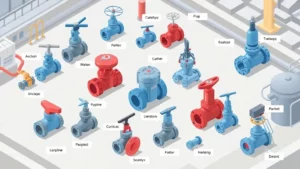Choosing the right valve for your pipeline application is crucial for ensuring optimal performance and reliability. Several factors must be considered, including the type of fluid being transported, the pressure and temperature conditions, and the specific function the valve will serve. Understanding these parameters will help you narrow down your options and select a valve that meets your operational needs. Additionally, consulting with industry experts can provide valuable insights into the best choices for your specific situation.
Another important consideration is the valve’s material construction. Different materials offer varying levels of resistance to corrosion, wear, and temperature fluctuations. For instance, stainless steel valves are often preferred in corrosive environments, while plastic valves may be suitable for less demanding applications. It’s essential to match the valve material with the characteristics of the fluid being transported to ensure longevity and performance.
Lastly, consider the valve’s size and compatibility with your existing pipeline system. Proper sizing is critical to maintaining flow rates and preventing pressure drops. Additionally, ensure that the valve’s design aligns with your system’s requirements, such as connection types and mounting options. By taking these factors into account, you can make an informed decision that enhances the efficiency and safety of your pipeline operations.




